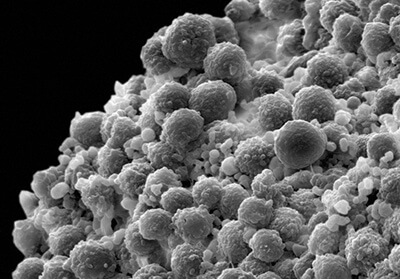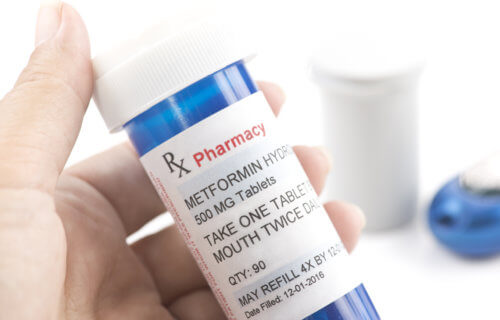NEW YORK — Does a popular diabetes drug actually help fight cancer, or is it just a myth? Researchers from Columbia University Irving Medical Center are finally shedding some much-needed light on the effect of the drug metformin on various forms of cancer. While it’s typically a prescription for patients with diabetes or prediabetes, study authors have found new evidence revealing the drug is indeed capable of stopping the progression of certain prostate cancers.
Ever since a 2005 study reported that diabetes patients taking metformin displayed lower rates of cancer, oncologists have theorized it may be possible to use this inexpensive, safe, and widely used drug to prevent or hinder the development of cancerous tumors. However, studies conducted since then focusing on prostate cancer and metformin have produced mixed results. Some found a lower incidence of prostate cancer among men using metformin, but others found no such relationship.
Metformin works by lowering blood sugar levels by helping the body’s cells use insulin more effectively. It also has a number of other beneficial effects, including reducing inflammation and oxidative stress.
Now, this latest work suggests metformin can prevent the progression of prostate cancer — but only among tumors displaying low levels of NKX3.1. Tumors with less of this tumor-suppressing gene are more likely to develop into aggressive cancers.
The study reports metformin restores cancer-fighting mitochondrial activity that is typically lost when NKX3.1 levels are low, helps stop prostate cancer progression in mice, and is also associated with better survival among patients with low-NKX3.1 tumors, but not high-NKX3.1 tumors.
“Where we see metformin having the biggest impact is in patients who’ve just been diagnosed with prostate cancer,” says Alex Papachristodoulou, Ph.D., associate research scientist, who conducted the research in the lab of Cory Abate-Shen, Ph.D., chair of the Department of Molecular Pharmacology & Therapeutics, in a university release.
After initially being diagnosed with prostate cancer, most patients display low-grade tumors that aren’t actually treated but instead monitored by active surveillance. Some of these tumors, of course, eventually turn aggressive and potentially life-threatening.
“Metformin could be given to patients under surveillance with high-risk tumors when there’s still time to prevent progression to advanced disease,” Prof. Abate-Shen adds.
“Until this study no one understood this essential aspect of metformin and which patients could benefit,” explains Columbia oncologist Mark Stein, M.D. While Dr. Stein was not involved in this new study, he is currently helping design a clinical trial to test the idea in newly diagnosed patients.
“The new work reinvigorates the idea of using this safe and inexpensive drug in a way that could benefit prostate cancer patients, potentially sparing them from additional treatment, and allows us to test the drug in a more focused way.”

The initial idea to test metformin and its interactions with NKX3.1 stemmed from Papachristodoulou and Abate-Shen’s earlier study, which originally showed how low levels of the protein promote prostate cancer.
Low levels of NKX3.1 have been linked with aggressive disease for a number of years, but it remained unclear why this deficiency, in particular, drove cancer development. Papachristodoulou and Abate-Shen uncovered that when prostate cells are under oxidative stress (which occurs during prostate cancer development), NKX3.1 moves into the cell’s mitochondria in order to reduce stress and protect the cells. If NKX3.1 levels are low, on the other hand, that means less protection is available, making prostate cells more likely to turn malignant.
“That’s when we realized how metformin might be able help, since metformin is known to act on the mitochondria,” Papachristodoulou says.
In order to assess metformin’s effect on low-NKX3.1 prostate cancers, the research team provided metformin to low-NKX3.1 mice that were likely to develop prostate cancer.
“These mice mimic the progression from lower- to higher-grade prostate cancer, similar to the cancers found in men who are put on active surveillance,” Papachristodoulou notes, “but with metformin, we were able to stop further progression of the cancer.”
Next, the study authors observed human prostate cancer cells and tissues, which led to the confirmation that metformin works on the same mitochondrial processes in people, preventing further cancerous changes.
“The work was very elegant,” Dr. Stein comments. “The models they have developed to understand the disease were key to answering the question. And to find a whole new mechanism of action for a drug that’s so ubiquitous is very unusual.”

Then, with the help of long-standing clinical collaborators James McKiernan, Renu Virk, and Mitchell Benson at Columbia, Max Loda at Cornell, and others in Europe, the research team retrospectively analyzed the effect of metformin across two groups of men who had been treated for prostate cancer (many patients in both groups took metformin for their diabetes).
After measuring NKX3.1 levels in tissue samples collected from patients, researchers noted that metformin appeared to only offer benefits to patients with low NKX3.1 levels and mitochondrial impairment. Significantly, among men with low NKX3.1 cancers under active surveillance, those taking metformin (three out of three) saw their cancer diagnoses downgraded during the surveillance period. Meanwhile, three out of four patients who did not take metformin had their cancers upgraded.
Papachristodoulou and Abate-Shen are currently working with Stein, McKiernan, Loda, and other researchers to put together a new clinical trial aimed at testing if metformin can prevent the progression of prostate cancer in men specifically with newly diagnosed, low-NKX3.1 tumors under active surveillance.
While NKX3.1 levels aren’t typically measured in men newly diagnosed with prostate cancer, based on the two cohorts examined, roughly 50 to 60 percent of patients may have low-expressing NKX3.1 tumors.
Moreover, researchers theorize Metformin may be particularly helpful for Black men because they are more likely than White men to develop aggressive prostate cancer.
“Though some of the health disparities are due to socioeconomic and health care inequities, we think there are biological factors like differences in NKX3.1 levels and mitochondria that also contribute,” Papachristodoulou adds.
In addition to further studies focused on finding additional biomarkers that identify patients with the greatest risk of developing aggressive prostate cancer, Papachristodoulou plans to continue pursuing disparities research in the Abate-Shen lab and during his future independent career, along with the help of a new K99/R00 grant he received last month.
Mitochondria, he hypothesizes, may provide more answers.
“The search for biomarkers that can predict prostate cancer development and progression has largely focused on the nuclear genome, overlooking the mitochondrial genome,” he concludes, “but we know that alterations in mitochondrial genes are associated with lethal prostate cancer, particularly in Black men. I’m hoping that with the new grant, I’ll be able to identify more mitochondrial-related biomarkers like NKX3.1 and we can ultimately improve survival.”
The study is published in the journal European Urology.
You might also be interested in:
- New 1-2 punch against metastatic prostate cancer is helping patients live longer
- Common diabetes drug metformin may also protect muscles
- Free online tool could save prostate cancer patients $9,000 in drug costs


This will never get any traction as long as the health care profession cannot make large amounts of money!
Sam Adams is correct but there are supplement companies like “Life Extension” who recognized the longevity promoting effects of metformin over a decade ago. I think that they produce their own metformin and have a doctor on staff who will write a prescription for it sight unseen.
Most doctors will not go outside of the blood sugar guidelines of A1c but those guidelines are wrong. A friend of mine, Oscar, could not get a prescription for metformin because his doctor said his blood sugar was borderline. Later, Oscar developed a staph infection in his foot and eventually his leg was cut off below the knee due to diabetes damage. Then his other leg was taken off below the knee. He could not get doctors to help him. Eventually he died of heart problems. Metformin is not entirely safe. In high doses the patient can get acidosis. This can be avoided by taking enough B vitamins, especially vitamin B1. Most doctors do not know this. The patients suffer from their doctor’s ignorance about vitamins and supplements.
Metformin was originally extracted from the roots of the French lilac bush. Really it is an herbal supplement.